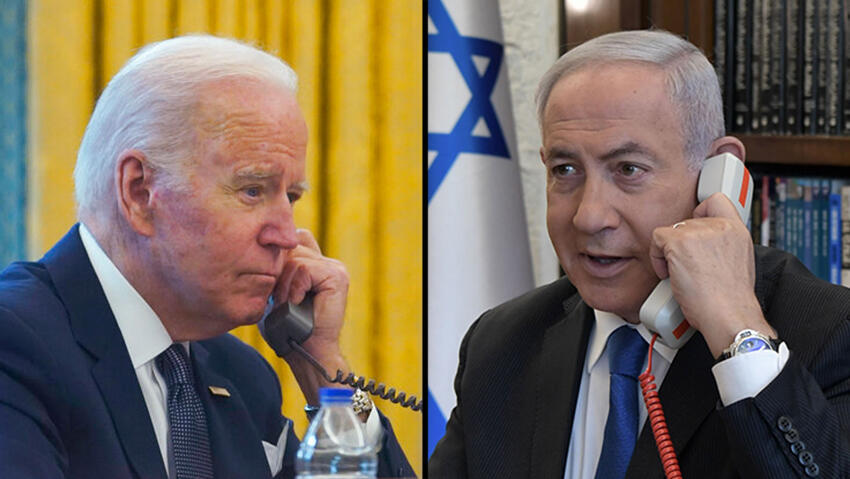Getting your Trinity Audio player ready...
Prime Minister Benjamin Netanyahu spoke with by phone with U.S. President Joe Biden on Thursday in a call that lasted for about45 minutes. The call came against the backdrop of an Israeli airstrike that led to the accidental deaths of seven World Central Kitchen (WCK) aid workers in the Gaza Strip, after which Biden said he was “outraged” about the incident. According to CNN, the talk was scheduled after the deadly attack.
Israeli officials said the conversation "went well," and claimed that it lasted 45 minutes, but the White House claimed on the other hand that it lasted "less than" half an hour.
The White House said in its readout of the conversation that two leaders discussed the situation in Gaza. President Biden "emphasized that the strikes on humanitarian workers and the overall humanitarian situation are unacceptable. He made clear the need for Israel to announce and implement a series of specific, concrete, and measurable steps to address civilian harm, humanitarian suffering, and the safety of aid workers. He made clear that U.S. policy with respect to Gaza will be determined by our assessment of Israel’s immediate action on these steps," according to the White House readout.
Biden also "underscored that an immediate ceasefire is essential to stabilize and improve the humanitarian situation and protect innocent civilians, and he urged the prime minister to empower his negotiators to conclude a deal without delay to bring the hostages home," the statement said.
Against the backdrop of the fear of Iranian revenge following the assassination in Damascus, "the two leaders also discussed public Iranian threats against Israel and the Israeli people. President Biden made clear that the United States strongly supports Israel in the face of those threats," the statement also said.
"This is not an isolated incident. This is a major reason why distributing humanitarian aid in Gaza has been so difficult – because Israel has not done enough to protect aid workers trying to deliver desperately needed help to civilians,” Biden said on Wednesday. "Incidents like these simply should not happen.”
Even sharper and clearer messages than Biden's came Thursday evening from senior members of Biden's administration, and Secretary of State Anthony Blinken even warned that American support for Israel will be limited if it does not make significant changes in the way the war is conducted. "If we don't see the changes from Israel that we need to see, there will be changes to U.S. policy."
A similar message came on Thursday from National Security Council spokesman John Kirby, who said after the Biden-Netanyahu conversation that the U.S. is interested in seeing a policy change in Israel. "We expect to see a dramatic increase in the arrival of humanitarian aid, the opening of more crossings, a reduction in violence against civilians and aid workers. We want to see that the Israelis are ready to take practical steps immediately," said Kirby. "We expect concrete steps to ease the humanitarian situation in Gaza. This is not just an announcement of steps and policy changes, but implementation. We will closely examine and monitor how they carry out their commitments. If there is no change in their policy then there will be a change on our part."
A U.S. source said prior to the leaders’ talk that Biden was expected to impress upon Netanyahu the need to provide better protection to humanitarian aid teams and also the need to increase food supplies to the Gaza Strip.
The source said that the president's anger was "indicative of the broader problem of how the Israelis are conducting their operations,” for “either not passing on to their military the deconfliction details from World Central Kitchen, or they’re being received and ignored,” according to the source.
Meanwhile senior Hamas leader said on Thursday that Egypt had put forward a cease-fire proposal to end the conflict in Gaza, but that it did not include anything new. He rejected the proposal.
He added U.S. and Egyptian mediators wanted to keep the cease-fire process alive despite their conviction that there was a wide gap between Israel and Hamas.
The Hamas leader said a new round of talks may be held before Eid al-Fitr, which marks the end of Ramadan, in Cairo next week between the mediating parties and the Israelis in a new attempt by mediators to reach a cease-ire deal.
"The Hamas leadership informed the Egyptian and Qatari mediators that what is being offered cannot be accepted, as it is a continuation of the stubborn Israeli position," he added.
Egyptian and Qatari efforts, backed by the United States, have so far failed to achieve a cease-fire.
Israel has said it would consider only a temporary truce to free hostages. Hamas has said it will let them go only as part of a deal to permanently end the war.
Netanyahu's office said on Tuesday the mediators had formulated an updated proposal for Hamas, and Israel expected the mediators to take vigorous action to advance the negotiations.
Meanwhile, Netanyahu also met a U.S. Congress Republican delegation on behalf of the American Israel Public Affairs Committee (AIPAC), the pro-Israel lobby in Washington, at his office in Jerusalem.
During the meeting, attended by senior officials, Netanyahu briefed the delegation on the fighting in the Gaza Strip and answered their questions, which, according to Netanyahu's office, touched on dismantling Hamas', ongoing efforts to release hostages, and the issue of humanitarian aid.
Netanyahu thanked the delegation, saying, "I have three messages for you: the first is we’re going to win. Victory is within reach. And there is no substitute for victory. The second is that it can be made quicker. I'll paraphrase someone you've all heard of Winston Churchill, he said: 'Give us the tools and we'll do the job.' Give us the tools faster and we'll finish the job faster. I'm talking about the supplemental. I hope you find a way to give it as fast as you can.”





